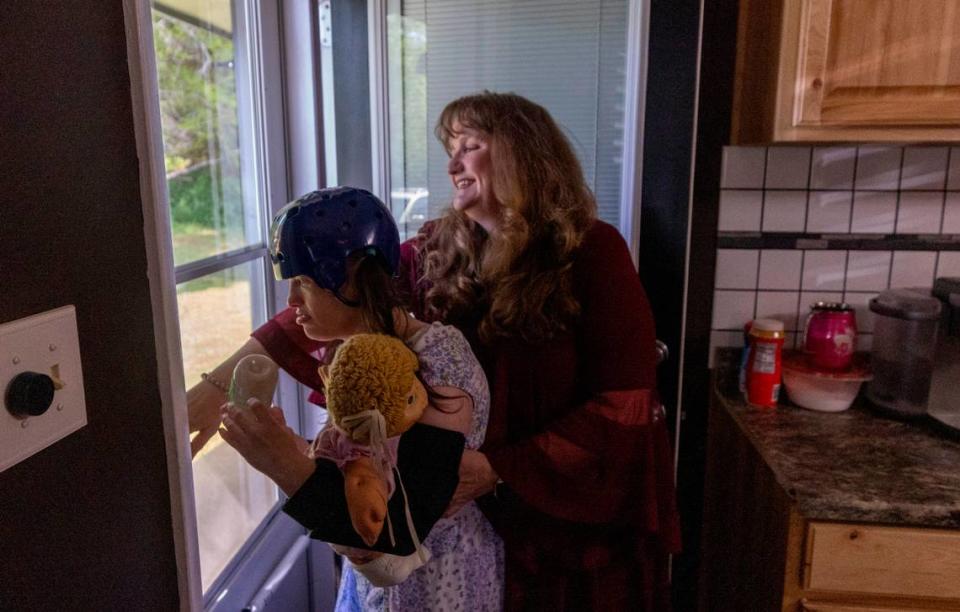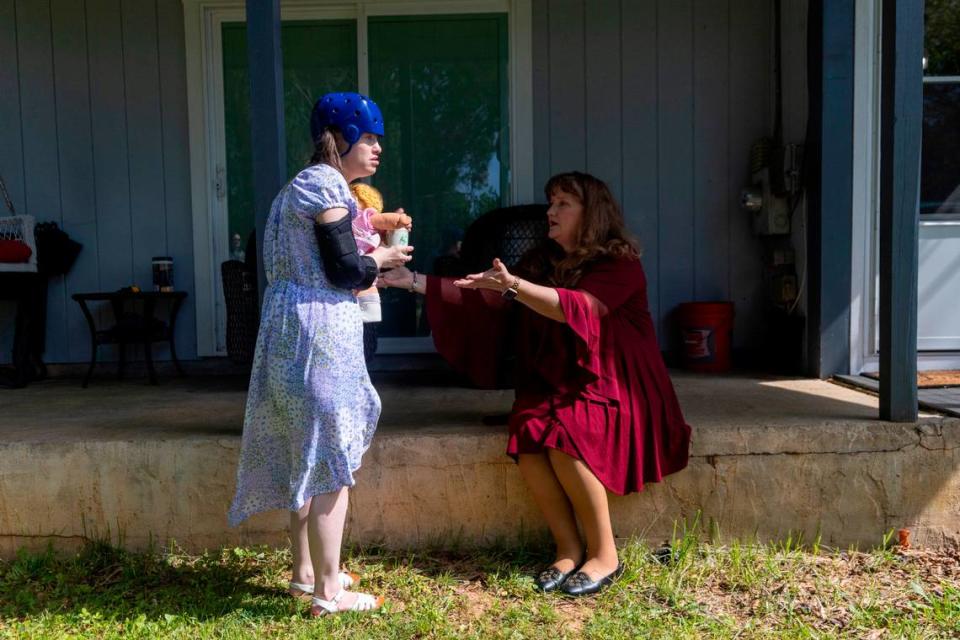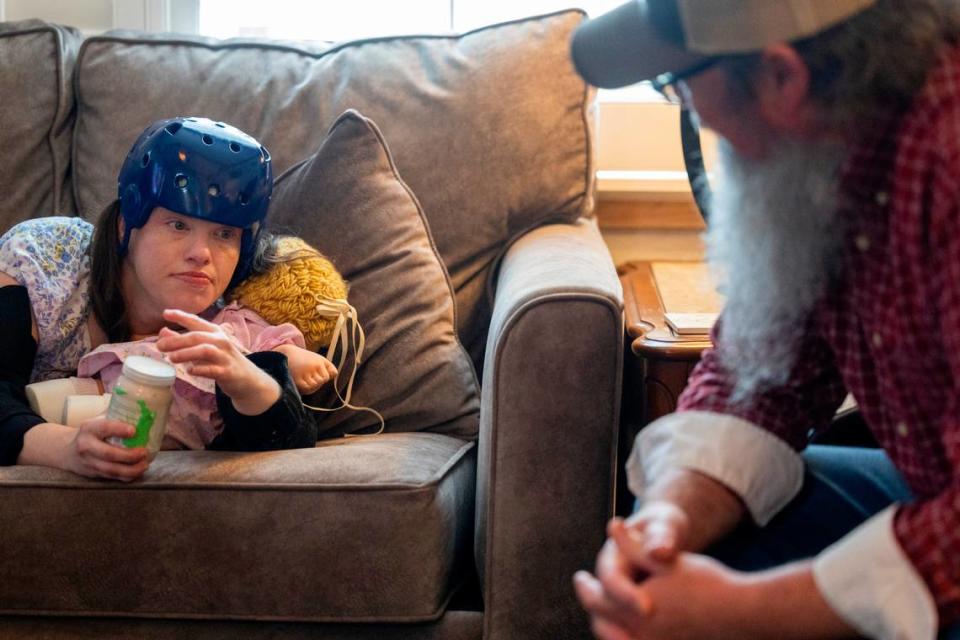Meet Samantha R. Her legal victory may improve behavioral care for thousands in NC.
About a decade ago, Dana and Tim Rhoney found themselves locked in battle with the state after struggling for years to get needed services for their daughter Samantha, who has a moving disorder and an intellectual disability.
“The only thing that we were asking for was just some additional service hours to have the workers to come in and give me relief in taking care of my daughter,” who is an “extreme self-abuser,” Dana told The News & Observer.
The Rhoneys would have caregivers come to their home through the N.C. Innovations Waiver, a backlogged state program that provides access to a wide range of behavioral health services for those who qualify.
But their regional mental health office — officially, Local Management Entity/Managed Care Organizations, which administer the waiver program — started cutting Samantha’s services, putting them all at risk, said the Rhoneys.
After two rejected appeals of denials of care through the state’s office of administrative hearings, the Rhoneys had to admit Samantha at the age of 27 into the J. Iverson Riddle Developmental Center, a state-operated developmental center in Morganton, they said. She was there for over seven years.
Lacking funds for an attorney, Tim said he had to represent Samantha’s interests in court both times. And both times, “There was not any talk about, ‘Hey, we’re going to give you the services to keep her in your home,’” he said.
These struggles led the Rhoneys to work with the legal advocacy group Disability Rights North Carolina, which filed a lawsuit in 2017 that became known as the Samantha R. case. Disability Rights NC argued that the failure to provide access to community- and home-based behavioral health services violated the rights of people with disabilities.
The state Department of Health and Human Services and Disability Rights NC are on the brink of entering into an agreement for the state to improve services.
“Even though our daughter is very challenging, she also is very vibrant and social. She loves to be around other people when she’s doing well and not having her behaviors,” said Dana.
At the institute, “Samantha was not able to access community so her ability to enjoy life and prosper and flourish was being dampened,” she said.

Agreement details
Lisa Grafstein, an attorney with Disability Rights and a Democratic senator representing Raleigh, told The News & Observer that Superior Court Judge Allen Baddour indicated that he would approve the consent order between the state and Disability Rights NC.
The agreement follows mediation between DHHS and Disability Rights NC after DHHS appealed an extensive order issued by Baddour in 2022.
Grafstein said the “appeal was a huge factor” in opting to go with mediation, citing delays and the possibility of a reversal of the 2022 ruling.
“Rather than that possibly, we’d prefer to have a forward-looking remedy,” she said.
The other reality is that in cases like this — as in the long-running Leandro school funding case — where “there’s a court order saying that people’s rights are being violated and the state needs to take action that involves the expenditure of money, then that becomes more of a struggle,” Grafstein said.
“So that’s, of course, in the background to all of this as well,” said Grafstein.
The General Assembly — which is tasked with passing the budget funding various departments and programs — is controlled by the GOP. According to a revenue forecast, the state is entering its short legislative session with a projected $1.4 billion surplus.
In the 2023 budget cycle, lawmakers invested $835 million in the mental health system. Of those funds, $176 million were used to raise Innovations waiver services rates so that providers would increase the wages of caregivers, known as direct support professionals. The General Assembly also provided $29 million to add 350 new Innovations slots, according to Summer Tonizzo, a spokesperson for DHHS.
But there are 17,000 people on the waitlist.
The 2022 order required the state to provide services to everyone on the list and to resolve the shortage of caregivers. It also required the state to cease new long-term admissions into institutional settings by 2028.
And while the new agreement does not eliminate the waiver waitlist, it sets a two-year period during which DHHS must work to transition more people into community-based services, including those on the waitlist and in institutional settings if they so wish.
DHHS is required to move at least 249 people out of institutions and into community-based settings by June 2027.

There are 13 state operated health care facilities that treat adults and children with mental illnesses, developmental disabilities, substance use disorders, and neuro-medical needs.
State Developmental Centers serve 715 people, neuro-medical centers serve 305 people and there are just under 600 people in the state psychiatric hospitals, said Tonizzo.
The agreement calls on DHHS to make sure regional mental health offices maintain adequate provider networks. It also has reporting requirements and allows future benchmarks to be set by the court after the two-year period.
Key pieces
For Grafstein, two key pieces in the agreement are the court review in two years and the section on the LME/MCOs. “A huge problem for a lot of people, even people who have access to services, is that there aren’t enough workers to provide services,” she said, citing issues with low wages for caregivers.
Grafstein said while the state legislature does set a floor for the rate to be paid to direct support professionals, LME/MCOs can pay more. “So it’s really just turning the focus to making sure that they’re actually paying rates that are sufficient, that they’re doing all the other things that they need to do to support providers,” she said.
Kelly Crosbie, director of the mental health, developmental disabilities and substance use services division at DHHS, told The N&O that DHHS was aligned with Disability NC in the desire “to make sure people are going to live where they want to, they can be integrated in the community.”
She also cited workforce issues. “We just have a lot of competition for the workforce,” she said. “That’s why we’re working with the community and the General Assembly to try to get more wage increases for those workers, because we have to be able to offer them good wages.”
Asked about the current wage for direct support professionals, Tonizzo said that according to research from 2022, the average hourly wage for DSPs in NC is $13.93. The legislative increases “will impact and should increase the average DSP rate across the state,” Tonizzo wrote in an email.
For Crosbie, other programs that will help fulfill the agreement are the recently launched Inclusion Connects Initiative, which helps link people to services in their community, and a new Medicaid entitlement that will allow Medicaid enrollees to get behavioral health services at home or in their community. This program will help those on the Innovations waiver waitlist get off of it and access services, she said.
As for the two-year review in the agreement, Crosbie said “we hope to learn a lot” before then.
“As we’re meeting and getting to know people on the waitlist, we will have a much better sense of what they truly need. We’ll have a much better sense of if those things we’re doing (are working),” she said.
Night and day
As for Samantha, after the ruling in 2022, a group home “stepped up” and took her in, said Dana.
Samantha is now 35 and has been at the group home for two years. For Dana, her daughter’s change in disposition has been like night and day.

“When she was at the institute, when we would go and take her back after the visit with us, she didn’t want to go back in. She wanted to stay with Mom and Dad,” said Dana.
But now, when she gets back to the group home, “that girl, she hurts my feelings, she’s jumping out of the car and going in,” she said, with joy ringing in her voice.


